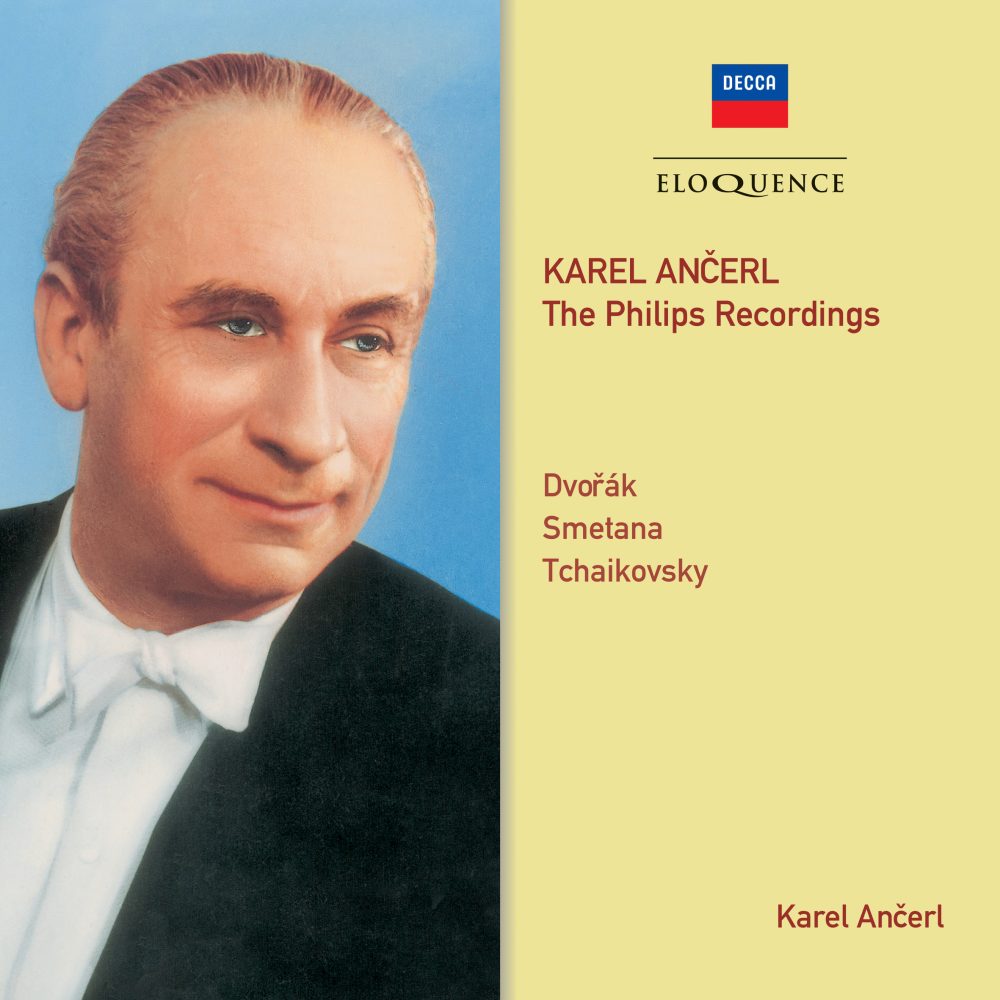Through many recordings on Supraphon, the sympathetic, dynamic relationship of Karel Ančerl with the Czech Philharmonic is well known, especially in native repertoire such as Dvořák and Smetana. To a lesser extent, his work late in life with the Toronto Symphony, once he had emigrated to Canada, is documented on CD. However, his brief but productive partnership with the Vienna Symphony Orchestra has long been forgotten. In fact, he made four LPs with them between February 1958 and February 1959, for the Philips label as it sought to establish itself in the early years of LP. These recordings were released on the Fontana imprint and they are reissued here together on CD for the first time.
Taken in the round, the recordings make an invaluable contribution to our understanding of an unfailingly warm and astute musician. Ančerl inspired affection wherever he went, even among hard-bitten orchestral players. His experience at the hands of the Nazis found a surprising but redemptive expression in his good humour, charm and sanguine detachment from politics. He could also secure playing of tremendous fire and refinement as may be heard in the Slavonic Dances on CD1 of this set. The ‘New World’ Symphony and ‘Vltava’ are also done as to the manner born, ‘well-phrased, euphonious and vivid’ according to Gramophone’s original review of the Smetana.
The rest of the set is dedicated to Tchaikovsky and this is mostly repertoire which he did not record elsewhere. In a keenly detailed booklet appreciation, Rob Cowan observes the rhythmic spring and elegant legato of the ballet suites – hallmarks of Ančerl’s conducting – while finding high voltage and no lack of intensity in the Fourth Symphony and the ‘Marche slave’. Cannons were unavailable for the ‘1812 Overture’; an enthusiastically played bass drum is enlisted in its place.
CD 1
ANTONIN DVOŘÁK
Symphony No. 9 in E minor, Op. 95 ‘From the New World’
Slavonic Dances, Op. 46
CD 2
BEDRICH SMETANA
Vltava (from Má Vlast)
PIOTR ILYICH TCHAIKOVSKY
Romeo and Juliet – Fantasy Overture
Marche Slave, Op. 31
Symphony No. 4 in F minor, Op. 36
CD 3
Ouverture solennelle ‘1812’, Op. 49
Valse (from Serenade for Strings in C major, Op. 48)
Swan Lake: Suite, Op. 20
The Sleeping Beauty: Suite, Op. 66a
The Nutcracker: Suite, Op. 71a
Wiener Symphoniker
Karel Ančerl
Recording Producer: Marius van der Meulen
Balance Engineers: Tony Buczynski, Herbert Schack (Dvořák: Symphony No. 9; Slavonic Dances, Op. 46; Smetana: Vltava; Tchaikovsky: Symphony No. 4; Valse from Serenade for Strings; Marche slave; Nutcracker Suite; 1812 Overture); Bruno Taschner, ??? Schack (Tchaikovsky: Romeo and Juliet); Bruno Taschner, Herbert Schack, Tony Buczynski (Tchaikovsky: Swan Lake, Sleeping Beauty – suites)
Recording Location: Grosse Saal, Musikverein, Vienna, Austria, 8–10 February 1958 (Dvořák: Symphony No. 9; Smetana: Vltava); 29 March–2 April 1958 (Tchaikovsky: Romeo and Juliet); 5–6 and 26–29 November 1958 (Dvořák: Slavonic Dances, Op. 46; Tchaikovsky: Symphony No. 4; 1812 Overture); 10–11 and 27–28 February 1958 (Tchaikovsky: Valse from Serenade for Strings; Marche slave; Nutcracker Suite); 23–26 February 1959 (Tchaikovsky: Swan Lake, Sleeping Beauty – suites)
Philips LP Releases: 875001 (Dvořák: Symphony No. 9); 698024 (Dvořák: Slavonic Dances, Op. 46); 875008 (Smetana: Vltava); 875013 (Tchaikovsky: Romeo and Juliet); 698009 (Tchaikovsky: Marche slave); 875011 (Tchaikovsky: Symphony No. 4); 698023 (Tchaikovsky: 1812 Overture); 700190 (Tchaikovsky: Swan Lake, Sleeping Beauty – suites); 875002 (Tchaikovsky: Valse from Serenade for Strings; Nutcracker suite)
‘It’s conceived in one piece, and absolutely fresh. The pacing and pace and control of articulation suggest the fresh air and the pungent smells of bush and heath… The tempi are all absolutely right… And Ančerl contrives as well to bring out characteristic detail, middle parts, grace notes, sonorities of various kinds, without damaging the flow of the music.’ Gramophone, March 1959 (Dvořák: Symphony No. 9)

